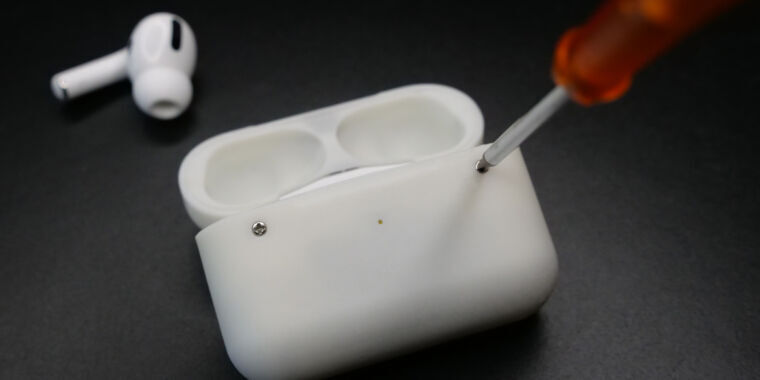Consumer tech has faced scrutiny over the years around "planned obsolescence": making devices so difficult to repair that shoppers have to buy new products and toss devices sooner than they'd like. Now, one do-it-yourself-er is on a mission to prove that it doesn't have to be this way. And he's starting with the (original) Apple AirPods Pro.
Ken Pillonel is no stranger to tweaking popular designs in the name of user convenience and sensibility. We've covered other projects of his, like a $38 part for making the AirPods Pro case self-serviceable and support USB-C, and adding Apple's Lightning port to a Samsung Galaxy A51. He has also modded the iPhone to use USB-C.
Today, the technologist revealed his latest concoction: an AirPods Pro case with a user-replaceable battery, USB-C port, and open source designs.
The original AirPods Pro received a 0 out of 10 repairability score from iFixit, which at the time said: "While theoretically semi-serviceable, the non-modular, glued-together design and lack of replacement parts makes repair both impractical and uneconomical."
Pillonel's take on the AirPods Pro case, which is detailed on his YouTube channel Exploring Simulation, included him modeling each case component and putting the case together with screws and nuts, "making them easily swappable and repairable," according to Pillonel's press release.
In an email, Pillonel told Ars Technica that his design's most repairable feature is the lack of glue.
"The main difficulty with the original case is removing what I call the 'outer shell,' so the [shiny] white outer plastic. Most people end up permanently deforming it because it's just basically a ball of glue," he said.
There is a small amount of glue in his own design, though, Pillonel told The Verge. It's used to keep some magnets put, but it's "cyanoacrylate glue that can easily be removed by soaking it with acetone, unlike Apple's green glue, which feels like concrete."
By ditching most of the glue, it should be easier to open the case when it needs a new battery instead of wasting money and resources on a new case, which is what Apple has advised.
Pillonel told Ars that he chose the first-gen AirPods Pro, rather than the second-gen AirPods Pro or non-Pro models, for this project because of its popularity and because he had already studied the product to make and sell his aforementioned USB-C kit, which required modeling every single part of the case and "is a lot of work."
"I don't plan to do the same for the other models," he added. "I will just model the outer shell for the other models, which already improves repairability greatly. I do plan to do a similar project for the earbuds themselves."
The Verge quoted Pillonel as saying it's challenging to make repairable earbuds because of how small they are and what tools he currently has access to. He hasn't been able to open the second-gen AirPods Pro case without damage.
In his press release, Pillonel said his goal is to demonstrate how the AirPods Pro "could have been easily made repairable with minimal effort" and to encourage customers "to be more mindful of their choices, and to motivate manufacturers to prioritize sustainability."
As with some of his previous projects, Pillonel's latest work casts a stark spotlight on Apple, a tech conglomerate that has not, or will not, release a set of AirPod earbuds that don't require buying a whole new case when a part of eventually dies (as you knew it would).
For this particular mission, Pillonel shared the parts he used, which included pricier machines, like a 3D printer, laser marking machine, and digital camera, as well as more easily attainable ones, like a $70 PCB holder. Surely, if a YouTuber could scrounge up the funds for the tools, Apple could, too. Of course, Apple would be challenged to find a way to figure out how to make any user-repairable product at a much larger scale than Pillonel.
It's worth remembering that Apple has made some recent progress in making its products more user-repairable, including launching its Self Service Repair program in 2022, but so far, that program only applies to some iPhone and Mac models.
Pillonel has made his files available for ProtonMail users for free through his Patreon. Beware that messing with an official AirPods Pro will void any Apple warranty. And this isn't the type of project you should embark on if you're not handy or haven't engaged in self-repairs like this before.
For everyone else, or anyone just curious about what it takes to make a user-repair-friendly AirPods Pro case, you can view Pillonel's video below:



